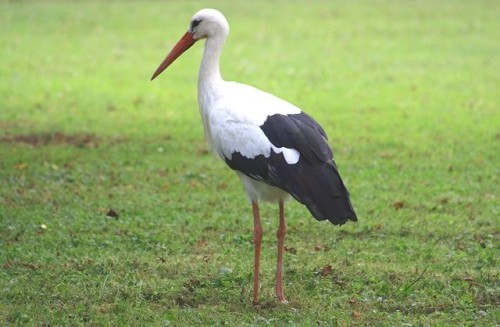|
STORK >> Motherly Kindness
 In the passage quoted from the book of Job, the wings of the ostrich are contrasted with those of the stork. In the passage quoted from the book of Job, the wings of the ostrich are contrasted with those of the stork.
There is a marked contrast between them, ostrich wings being composed of showy plumes useless for flight, and the wings of the stork being long and firm, adapted to flights both high and prolonged. But the contrast meant by the ancient writer is between the characters of the birds, especially in regard to their affection for their young. This also is exhibited in the structure of the wings; for the light plumage of the ostrich has no capacity and expresses no desire for protection of the little ones; to which motherly work the stork’s strong pinions are as well suited as for flight.
The Hebrew name for the stork is “kindness.” It is a slightly modified form of the word which occurs in such expressions as “Shew kindness to thy servant”; “Have mercy upon me, O God, according to thy lovingkindness.” The Romans called it the “pious bird” (pia avis), from its dutifulness both to its young, and, as they believed, to its parents also. Mr. Wood says: The stork is noted for being a peculiarly kind and loving parent to its young, in that point fully deserving of its Hebrew name, though its love manifests itself towards the young, and not towards the parent.
Tristram relates that he:
. . . was once in a camp near an old ruined tower in the plains of Zana, south of the Atlas, where a pair of storks had their nest. The four young might often be seen from a little distance, surveying the prospect from their lonely height, but whenever any of the human party happened to stroll near the tower, one of the old storks, invisible before, would instantly appear, and, lighting on the nest, put its feet gently on the necks of all the young, so as to hold them down out of sight till the stranger had passed, snapping its bill meanwhile, and assuming a grotesque air of indifference and unconsciousness of there being anything under its charge. (Dictionary of the Bible)
It should be mentioned further that the stork is a migratory bird, in its journeyings flying very high, in large flocks, and returning with remarkable certainty to its old haunts; and that its long legs are made for wading in shallow pools and streams, in which it catches the fish, eels, frogs, and other small creatures which naturally constitute its food. We may safely see in the stork the affection for observing and thinking carefully of little children, for understanding the ways of education, and providing for them suitable natural information. It does not seem to represent a very interior affection, but one which is very faithful to duty.
The passages in the Bible where it is mentioned refer to the natural habits of the bird, but do not very fully illustrate its meaning. “Where the birds make their nests; as for the stork, the fir trees are her house” (Psalm 104:17). “Yea, the stork in the heaven knoweth her appointed times; and the turtle and the crane and the swallow observe the time of their coming; but my people know not the judgment of the Lord” (Jeremiah 8:7).
Author: JOHN WORCESTER 1875
|